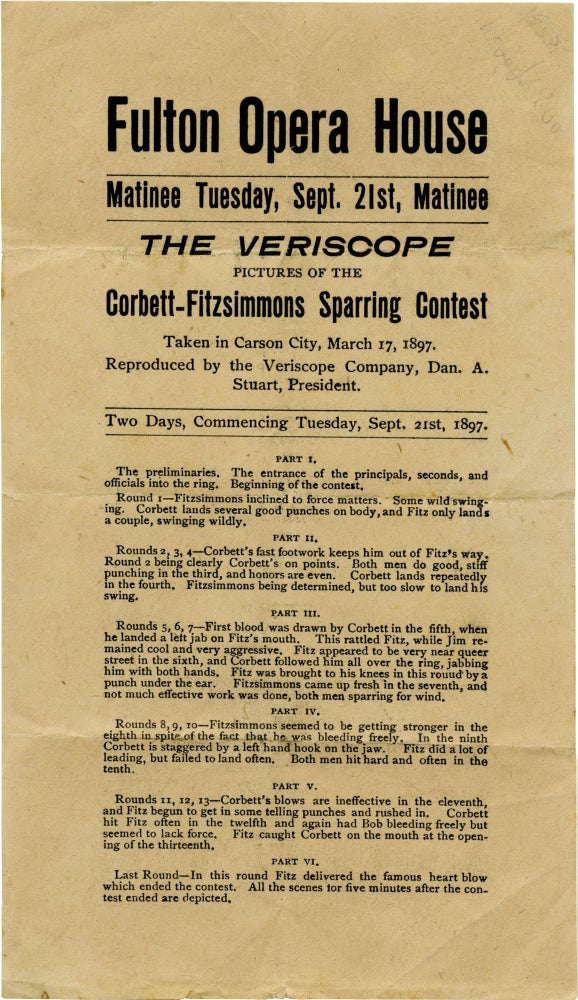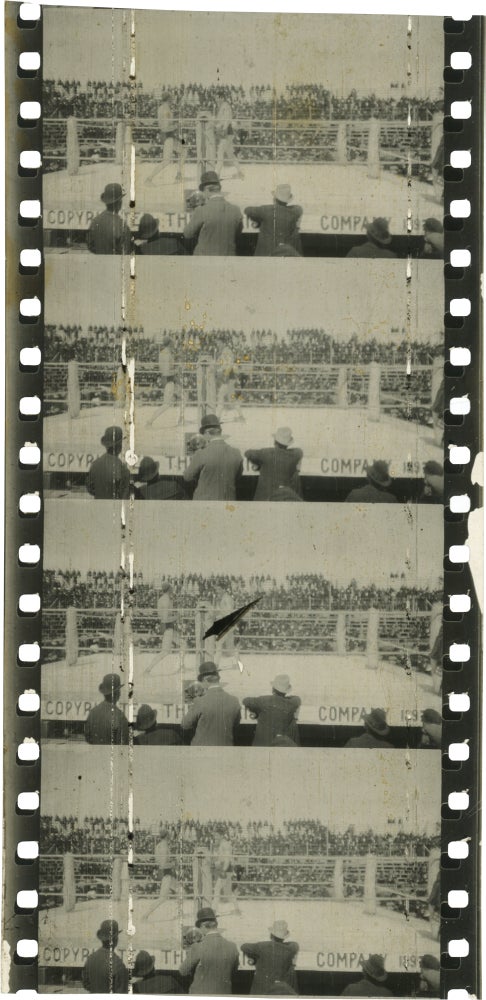The Corbett-Fitzsimmons Fight
N.p. Veriscope, 1897. Two vintage fragments from a 63mm film print of the 1897 boxing match between "Gentleman" Jim Corbett and Bob Fitzsimmons. The first fragment consists of six frames depicting the fighters in a clinch, while the second consists of four frames depicting the fighters in the center of the ring about to trade punches.
At over 100 minutes, the film is the first feature length release anywhere, and, with an aspect ratio of 1.65:1, the first widescreen film ever produced. Though fragments such as this survive, the film in its entirety is considered lost.
A five frame fragment is held the National Media Museum in the UK, and approximately 19 minutes are available for viewing, but OCLC locates no fragments in institutions.
The heavy weight title bout took place on March 17, 1897 in Carson City, Nevada, which legalized boxing specifically to host this fight, beginning the long and storied relationship between the Silver State and the sweet science. Boxing was already a popular subject for filmmakers, however, these were short films generally of single rounds. Using the new Latham loop technology, which he claimed to have invented, director Rector shot the Corbett-Fitzsimmons fight continuously using three adjacent ringside cameras, with each camera capable of shooting six minutes of footage before reloading. In total, approximately 11,000 feet of film was shot over all 14 rounds of the contest. In addition to length, the film distinguished itself from the boxing films of the time by presenting an introduction to the fight (by former champion John L. Sullivan and his manager), the fighters entering the ring in their robes, the fighters resting between rounds, and, in later releases, the immediate aftermath of the fight, all of which are standards of boxing broadcasts to this day.
On release, the film became a sensation and gained wide and lasting popularity, proving the financial viability of feature length films, as well increasing the public's interest in both motion pictures and boxing, becoming a landmark in the history of film and sports.
Also included is a flyer for a showing of the film on September 21, 1897 at the Fulton Opera House in Lancaster, PA, including a brief synopsis of the action.
First film print 2.5 x 7.25 inches. Very Good, with chips to some of the sprocket holes on the right edge and to the upper right corner of one frame, a 3/4 inch closed horizontal tear to the bottom frame and a bit of accompanying loss to the image, and a vertical scratch running through the left edge of each frame.
Second film print 2.5 x 4.75 inches. Very Good plus, with vertical scratches running through each frame.
Flyer 4.25 x 7.25. Near Fine. Light horizontal and vertical creasing from being folded, light edgewear.
Film strips encapsulated in mylar. Housed in a custom quarter leather clamshell box.
National Film Registry.
[Book #139206]
Price: $5,500.00
See all items in: Boxing, Documentary, Film Ephemera, Lost Film, National Film Registry, Sports
![[Book #139206] The Corbett-Fitzsimmons Fight. Enoch J. Rector, Bob Fitzsimmons James J. Corbett, director, subjects.](https://royalbooks.cdn.bibliopolis.com/pictures/139206.jpg?width=768&height=1000&fit=bounds&auto=webp&v=1490131907)

